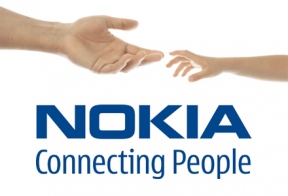Financial fallout from last week’s Q1 earnings from beleaguered handset maker Nokia, which saw the company report declines in sales, profit and much else across the board: Fitch Ratings has once again downgraded the handset maker.
Nokia now stands at a BB+ rating from a previous rating of BBB- for its senior unsecured notes, Fitch writes in a statement. That puts the company’s stock at “below investment grade,” primary analyst Owen Fenton tells me, BBB- having been the lowest investment grade rating. Fitch further says that it has downgraded the company’s long-term issuer default rating, with the outlook on the long-term IDR now at “Negative” and that it may consider downgrading even further.
Nokia, as of March 31 2012, had gross cash balances of €9.8 billion, and a net cash position of €4.9 billion. In its quarterly results last week it reported that sales were down by $4 billion (€3.4 billion) to $9.7 billion (€7.4 billion), with a corresponding fall in earnings per share, down by a quarter of a euro and now at a loss per share of just over $0.10 (€0.08). Smartphones, the core of Nokia’s fightback strategy, declined by more than 50 percent both in revenues and unit sales.
“Nokia’s profile is no longer commensurate with an investment grade rating,” Fenton writes, citing not only the Q1 declines in Nokia’s core Devices and Services segment but also the fact that Nokia is not giving much more positive guidance for the quarter ahead, expecting -3 percent operating margins. The news comes after Moody’s on April 16 downgraded Nokia stock to its lowest investment grade.
Nokia has issued a response already to the rating, from Timo Ihamuotila, Nokia’s CFO, promising a quick response — which may mean more layoffs and other culling measures to drastically bring down costs:
“We are quickly taking action to position Nokia for future growth and success. Nokia will continue to increase its focus on lowering the company’s cost structure, improving cash flow and maintaining a strong financial position,” he said in a written statement.
For Fitch — and really for all of us watching the company — Nokia needs to show “substantial improvements” over the next few quarters in cash flow and profit margins if it hopes to improve its credit standing and avoid slipping even more.
“Fitch is currently not convinced that Nokia can attain this over the course of 18 months,” it writes.
Altogether, revenues in devices, Nokia’s most important segment, were down by 40 percent in Q1 to €4.2 billion. Within that there were some positive and negative stories:
Nokia has now sold 2 million units of the Lumia device, and the fact that it is driving hard to get more of those devices out into the market, are positive signs. But Nokia also saw declines in lower-end devices — an area that it had managed to keep stable up to now — and that is a worrying signal for what might come next. Nokia yesterday announced that it was upgrading the web browser in its feature phones to make it work faster and cost consumers less money to use.
